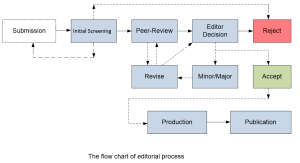Economic Thought and Practice operates a rigorous and transparent peer-review process that aims to maximize the quality of the articles. The peer-review process is carried out by researchers and scholars.
The peer-review is a double-blind assessment with at least two independent reviewers, followed by a final acceptance/rejection decision by majority of votes from the Editor-in-Chief, Junior Editor and Section Editors. The Editor-in-Chief is responsible for the academic quality of the publication process, including acceptance decisions.
A summary of the editorial process is shown in the flowchart below.

Submission
Submitted manuscripts should be written in accordance with the Aims and scope of the Journal. Authors should follow the journal’s Instructions for Authors carefully. Authors are also advised to seek English editing services before submitting their manuscript or to seek advice from an English-speaking colleague to improve the quality of the manuscript.
Each manuscript submission must be accompanied by a handwritten Statement, signed by all authors, and a Cover letter. The Cover letter should be concise and explain why the content of the paper is significant by placing the findings in the context of existing work. It should briefly explain why the manuscript fits into the thematic area of the Journal.
Stage 1: Initial screening
Immediately after submission, the journal Editor(s) will perform an initial check to assess:
- Overall suitability of the manuscript to the Journal;
- Manuscript adherence to high quality research and ethical standards;
- Standards of rigor to qualify for further review.
After the initial evaluation, the editor can decide whether to proceed with the peer review, reject a manuscript or request a revision before the peer review.
The Editor-in-Chief,Junior Editor and/or Section Editors are not allowed to make decisions on their own manuscripts submitted to the journal, as this would constitute a conflict of interest. Instead, a member of the Editorial Board is responsible for decision-making.
Note: All manuscripts received are checked for plagiarism. Plagiarism, data falsification and image manipulation will not be tolerated. If plagiarism is detected at any stage of the peer review process, the manuscript will be rejected.
Stage 2: Peer-review
From submission to final decision or publication, a member of journal administration (one of Administrative editors) coordinates the review process and serves as the main contact for authors, editors and reviewers.
Economic Thought and Practice uses a double-blind peer review process in which the author(s) do not know the identity of the reviewer(s) and the reviewer(s) do not know the identity of the author(s).
At least two reviewer reports will be collected for each article submitted and review round.
Authors may indicate the names of potential reviewers they do not wish to be considered in the review of their manuscript. If this is the case, this request must be indicated and elaborated when the manuscript is first submitted (i.e. in the Cover Letter). The editorial team will respect such wishes as long as they do not interfere with the objective and thorough evaluation of the submitted manuscript.
Stage 3: Revision
In cases where only minor or major revisions are recommended, the editors will ask the author to revise the paper before re-submitting to the Journal. In cases of conflicting review reports or where one or more recommendations for rejection are made, the Editor-in-Chief and/or Associate Editors will be asked for their judgement before a decision on revision is communicated to the authors.
Revised versions of manuscripts may or may not be sent to reviewers, depending on whether the reviewer has asked to see the revised version. By default, the revised manuscript is sent to reviewers who request a major revision.
Stage 4: Editor Decision
The decision to accept manuscripts will be made by the Editor-in-Chief, Junior Editor and/or Section Editors after at least two review reports have been received.
The Editor-in-Chief, Junior Editor and/or Section Editors may choose between the following options:
- Accept as is;
- Accept after minor revisions (corrections of minor methodological errors and text editing);
- Reconsider after major revisions;
- Reject (article has serious flaws, additional experiments needed, research not done correctly).
Reviewers make recommendations and the Editor-in-Chief, Junior Editor and/or Section Editors are free to disagree with their views. If they do, they should justify their decision to the authors and reviewers.
Stage 5: Production
The Journal staff handles the production of all manuscripts, including language editing and proofreading. Language editing is carried out by professional English editors. Authors are free to use other English editing services as they deem it appropriate.
Publication Ethics
Details on ethical considerations for submitting papers can be found in the instructions for authors of journal Ethical Guidelines for Journal Publication. Economic Thought and Practice follows COPE’s procedures for dealing with potentially unethical behaviour by authors, reviewers, or editors. Available at: https://publicationethics.org/guidance/Guidelines
If redundant publication, plagiarism, peer review manipulation, reuse of material or data without authorisation, copyright infringement or some other legal issue is detected after publication, we may publish a correction or retract the paper as per COPE Guidelines. Available at: https://publicationethics.org/files/retraction-guidelines-cope.pdf


